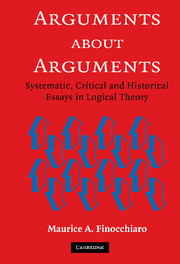Book contents
- Frontmatter
- Contents
- Preface and Acknowledgments
- Introduction : An Approach to a Branch of Logic
- Theorizing about reasoning and argument
- Fallacies and asymmetries
- Critiques
- Historical analyses
- 18 The Concept of Ad Hominem Argument in Galileo and Locke (1974)
- 19 Newton's Third Rule of Philosophizing : A Role for Logic in Historiography (1974)
- 20 Logic and Rhetoric in Lavoisier's Sealed Note : Toward a Rhetoric of Science (1977)
- 21 The Concept of Judgment and Huygens' Theory of Gravity (1980)
- 22 Empiricism, Judgment, and Argument : Toward an Informal Logic of Science (1988)
- 23 Criticism, Reasoning, and Judgment in Science (1995)
- Selected Bibliography
- Index
18 - The Concept of Ad Hominem Argument in Galileo and Locke (1974)
from Historical analyses
Published online by Cambridge University Press: 05 February 2015
- Frontmatter
- Contents
- Preface and Acknowledgments
- Introduction : An Approach to a Branch of Logic
- Theorizing about reasoning and argument
- Fallacies and asymmetries
- Critiques
- Historical analyses
- 18 The Concept of Ad Hominem Argument in Galileo and Locke (1974)
- 19 Newton's Third Rule of Philosophizing : A Role for Logic in Historiography (1974)
- 20 Logic and Rhetoric in Lavoisier's Sealed Note : Toward a Rhetoric of Science (1977)
- 21 The Concept of Judgment and Huygens' Theory of Gravity (1980)
- 22 Empiricism, Judgment, and Argument : Toward an Informal Logic of Science (1988)
- 23 Criticism, Reasoning, and Judgment in Science (1995)
- Selected Bibliography
- Index
Summary
Introductory Considerations
There is an activity which, in the world of thoughts and ideas, can be as rewarding and as exciting as literacy criticism is in the world of images and impressions. It is the critical understanding of actual reasoning and may be called “logical criticism.” It is partly with this attitude that I undertake the reconstruction of certain arguments found in Galileo's writings.
I say “partly” because this analysis is more than a mere exercise in logical criticism; it is part of a new interpretation of Galileo which, by emphasizing the logical skills and sophistication he displays, would make “the father of modern science” first and foremost a logician. At any rate, since the technique under consideration is very frequently used by him and has often been misunderstood, it is very important to become clear about it by studying the contexts where he is explicit about its use — by himself or by others.
Moreover, it so happens that these passages provide new evidence for the history-of-philosophy thesis of a Galilean origin of Locke's ideas.
Finally this investigation constitutes a chapter in the rather interesting history of the notion of ad hominem argument. Part of it has been studied by C. L. Hamblin in his Fallacies. He distinguishes two conceptions of ad hominem argument. The one prevalent among contemporary logic books is described by him as reasoning such that “a case is argued not on its merits but by analyzing (usually unfavorably) the motives or background of its supporters or opponents.
- Type
- Chapter
- Information
- Arguments about ArgumentsSystematic, Critical, and Historical Essays In Logical Theory, pp. 329 - 339Publisher: Cambridge University PressPrint publication year: 2005



